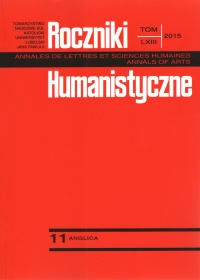The middle of a family: Reflexively marked structures in Polish
Abstract
The paper is devoted to an analysis of ‘notional middles’ in Polish within a construction-based morpho-syntax. The problem of the distinction which should, or should not, be drawn between middle and anticausative structures is taken up here. We analyze the Polish data, considering the correlation of major parameters distinguishing middles and anticausatives in languages of the world, and decide that in Polish ‘notional middles’ constitute a single class. As a consequence, the differences between anticausatives and middles should not be reflected by distinct structures ascribed to these groups of forms by grammar. The existent differences should be attributed to broader context and to encyclopedic knowledge concerning events.
References
Ackema, Peter, and Maike Schoorlemmer. 2006. “Middles.” In Martin Everaert, and Henk Van Riemsdijk (eds.). The Blackwell Companion to Syntax. Vol III, 131–203. Oxford: Basil Blackwell.
Alexiadou, Artemis, and Edit Doron. 2012. “The Syntactic Construction of Two non-Active Voices: Passive and Middle.” Journal of Linguistics, 48: 1–34.
Alexiadou, Artemis. 2010. “On the Morphosyntax of (Anti)causative verbs.” In Malka Rappaport Hovav, Edit Doron, and Ivy Sichel. (eds.). Lexical semantics, syntax, and event structure, 177–203. Oxford: Oxford University Press.
Alexiadou, Artemis, and Elena Anagnostopoulou. 2004. “Voice Morphology in the Causative-Inchoative Alternation; Evidence for a Non-Unified Structural Analysis of Unaccusatives.” In Artemis Artemis, Elena Anagnostopoulou, and Martin Everaert (eds.). The Unaccusativity Puzzle, 114–136. Oxford: Oxford University Press.
Aronoff, Mark. 1976. Word formation in Generative Grammar. Cambridge, MA: MIT Press.
Beard, Robert. 1981. The Indo-European Lexicon : a Full Synchronic Theory. Amsterdam: North-Holland Publ. Co.
Borer, Hagit. 2005. The Normal course of Events. Structuring Sense. Vol. II. Oxford: Oxford University Press.
Bułat, Ewa. 2004. “Reflexive Verbs as Null Object Licensers in Polish. Similarities between the Reflexive się and Small pro.” Poznań Studies in Contemporary Linguistics 39: 29–38.
Carlson, Gregory. 1977. Reference to Kinds in English. New York, London: Garland Publishing, Inc.
Cetnarowska, Bożena. 2004. “The Scale of Pronominal Strength in Polish: an OT Analysis of Unstressed and Weak Pronouns.” Poznań Studies in Contemporary Linguistics 39: 39–57.
Chomsky, Noam. 1970. Remarks on Nominalization. In Roderick Jacobs, and Peter S. Rosenbaum (eds.). Readings in English Transformational Gramma, 184–221. Walthan, MA: Blaisdel.
Chomsky, Naom. 2000. “Minimalist Inquiries:the Framework.” In Roger Martin, David Michaels, and Juan Uriagereka (eds.). Step by Step: Essays in Minimalist Syntax in Honor of Howard Lasnik, 89–155. Cambridge, MA: MIT Press.
Cichosz, Natalia. 2012. “High datives in Polish.”
Dowty, David. 1979. Word Meaning and Montague Grammar. Dordrecht: Reidel.
Embick, David. 2009. “Roots, States, and Stative Passives.” Abstract for Root Workshop, University of Stuttgart.
Fellbaum, Christine. 1986. On the Middle Construction in English. Bloomington: Indiana University Linguistics Club.
Grashchenkov, Pavel. 2015. “United Voices.” A paper presented at SLE, Leiden, 2nd September 2015.
Grzegorczykowa, Renata, Roman Laskowski, and Henryk Wróbel (eds.). 1984. Morfologia [Morphology]. Warszawa: PWN.
Grzybowska, Marta, and Agnieszka Rembiałkowska. 2015. “ The Middle Voice in Polish: an Attempt at Rehabilitation.” To appear in Studies in Polish Linguistics.
Janic, Katarzyna. 2014. “A Rare Type of Reflexive Use in Slavonic Languages.” In Jacek Witkos, and Sylwester Jaworski (eds). New Insights into Slavic Linguistics, 3, Sprach- und Kulturkontakte in Europas Mitte, 161–178. Frankfurt am Main, Berlin: Peter Lang.
Fehrmann, Dorothee, Uwe Junghanns, Denisa Lenertová. 2011. “Decausatives in a Minimal Theory of Reflexive Marking.” A paper presented at FDSL conference in Goettingen, 9th December, 2011.
Kemmer, Suzanne. 1993. The Middle Voice. Typological Studies in Language, 23. Amsterdam: John Benjamins.
Kibort, Anna. 2004. Passive and Passive-like Constructions in English and Polish. Ph.D. Cambridge University, Cambridge.
Krzek, Małgorzata. (to appear) “Impersonal się Constructions in Polish.”
Krzek, Małgorzata. 2014. “The Structure of Null Subject DPs and Agreement in Polish Impersonal Constructions.” In Anna Bondaruk, Gréte Dalmi, and Alexander Grosu (eds.). Advances in the Syntax of DPs: Structure, Agreement, and Case, 129–163. Linguistik Aktuell/Linguistics Today, 217. Amsterdam: John Benjamins.
Laskowski, Roman. 1984. “Kategorie morfologiczne języka polskiego – charakterystyka funkcjonalna.” [Morphological Categories of the Polish Language – a Functional Characteristic]. In Renata Grzegorczykowa, Roman Laskowski, and Henryk Wróbel H. (eds.). Morfologia [Morphology], 121–163. Warszawa: PWN.
Levin, Beth, and Malka Rappaport Hovav. 1995. Unaccusativity. At the Syntax-Lexical Semantics Interface. Linguistic Inquiry Monograph 26. Cambridge, Mass: MIT Press.
Marelj, Marijana. 2004. Middles and Argument Structure across Languages. Ph.D. Disseration: Utrecht University, Institute of Linguistics.
Młynarczyk, Anna. 2004. Aspectual Pairing in Polish. Ph.D. Dissertation: Utrecht University.
Przepiórkowski, Adam, Mirosław Bańko, Rafał Górski, and Barbara Lewandowska-Tomaszczyk (eds.). 2012. Narodowy korpus języka polskiego [National Corpus of the Polish Language]. Warszawa: PWN.
Ramchand, Gill. 2008. Verb Meaning and the Lexicon: A First Phase Syntax. Cambridge: Cambridge University Press.
Reinhart, Tanya, and Tal Siloni. 2005. “The Lexicon-Syntax Parameter: Reflexivization and Other Arity Operations.” Linguistic Inquiry 36: 389–436.
Tabakowska, Elżbieta. 2003. “Those Notorious Polish Reflexive Pronouns: a Plea for Middle Voice.” Glossos 4: 1–18.
Vendler, Z. 1967. Linguistics in Philosophy. New York: Cornell University Press.
Wróbel, Henryk. 1984. “Słowotwórstwo czasowników” [Word-formation of verbs]. In Renata Grzegorczykowa, Roman Laskowski, and Henryk Wróbel. Morfologia [Morphology], 467–511. Warszawa: PWN.
Copyright (c) 2015 Roczniki Humanistyczne

This work is licensed under a Creative Commons Attribution-NonCommercial-NoDerivatives 4.0 International License.





